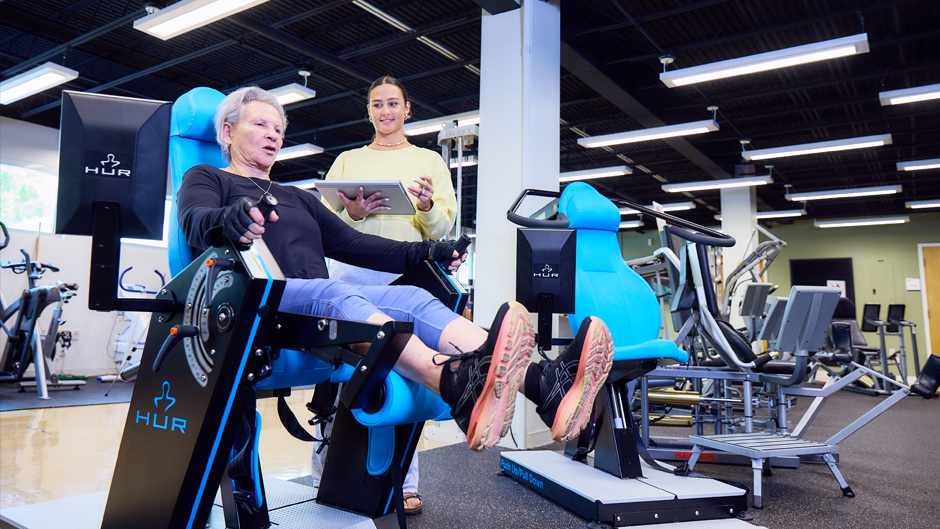When Caleb Calaway enrolled at the University of Miami as a first-year student, he was considering a career in public health. But after learning about the School of Education and Human Development’s exercise physiology program, he found a new passion and changed his career plans.
“This is an amazing program with unique learning opportunities,” said Calaway, who is now a doctoral student conducting innovative research and teaching undergraduate students in the Department of Kinesiology and Sport Sciences (KIN) Laboratory of Neuromuscular Research and Active Aging.
Guided by professor Joseph Signorile, who directs the laboratory, Calaway is conducting velocity-based training studies with individuals who have Parkinson’s disease, while mentoring undergraduates on the academic research and publishing process. “Our doctoral and undergrad students will be coauthors on our upcoming publications, helping them benefit from the many hours they spend learning in our laboratory,” said Signorile.
Calaway is one of four doctoral students advancing their exercise physiology careers through hands-on research and teaching at the laboratory in the Max Orovitz Laboratory.
For instance, Mandy Virgets is conducting an evaluation of two different styles of yoga to assess their impact on the physical and cognitive performance of Parkinson’s disease study participants. “Along with exercise physiology, I have been a yoga instructor for many years,” she said.
After earning her undergraduate degree from the University of Alabama and a master’s degree from East Tennessee State University, Virgets learned about the KIN program from her peers in the National Strength and Conditioning Association. “I plan to work in the field of longevity,” she said. “Dr. Signorile is a wonderful mentor, and the amount and the quality of research being done in his lab is simply incredible.”
Kylie Martinez followed a similar education path, earning an undergraduate degree in exercise physiology at Grand Valley State University and a master’s degree at Western Michigan University. A yoga instructor as well as a doctoral candidate, Martinez is now conducting a yoga intervention study with adults ages 60 to 90 in the KIN lab.
“I enjoy both teaching and research, and it’s wonderful to have the opportunity to work on innovative projects, while helping undergrads boost their skills,” she said. “I want to work with Parkinson’s patients in the future, and it’s great to take part in the leading-edge research here.”
Zachary Ripic studied golf biomechanics as an undergraduate at Pennsylvania State University and earned a master’s degree at Appalachian State University before joining the laboratory of Moataz Eltoukhy, associate professor, as a doctoral student. In his KIN studies, Ripic focused on gait analysis using innovative artificial intelligence (AI) tools.
“Capturing movement patterns has been an involved process,” said Eltoukhy. “An athlete, patient, or study participant has to wear special clothes with multiple markers visible for a video camera. Afterwards, the clothing and markers need to be removed, lengthening this time-consuming process.”
Now a postdoctoral student, Ripic has trained AI algorithms on varied populations in order to capture movement patterns without markers, making it much easier to record and evaluate gait patterns in a more natural setting. “Data collection and processing can be done in a few minutes,” said Ripic. “That’s huge in fields like neurology, sports medicine, and athletics.”
Today, the KIN laboratory is one of the leading U.S. institutes in using AI and machine learning in movement studies, according to Eltoukhy. “We look forward to helping our students stay in the forefront of biomechanics through our dynamic exercise physiology program.”

